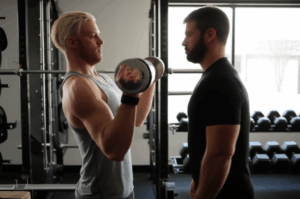In a world saturated with fitness trends, it’s easy to get lost in the noise. The Fit Bear, a nutrition company committed to improving clients’ relationships with food, fitness, and their bodies, offers a refreshing perspective. Let’s explore the core elements of fitness: nutrition, movement, and mindset, and how to cultivate a sustainable and fulfilling approach to well-being.
The Ever-Evolving Fitness Landscape
The fitness industry is constantly changing, adapting to new consumer demands, technologies, and business models. Several key trends are shaping the fitness landscape in 2025:
- Hybrid Fitness Models: Blending in-person and online training options, these models cater to the modern need for flexibility, offering the convenience of home workouts with the motivation of in-person training.
- Functional Fitness: Focusing on exercises that mimic daily movements, enhancing strength, mobility, and reducing the risk of injury. It improves performance in everyday activities like lifting, twisting, reaching, and balancing.
- Wearable Technology: Fitness trackers, smartwatches, and other devices providing data and insights to help monitor progress, set goals, and make informed decisions.
- Recovery as a Priority: Incorporating techniques like foam rolling, stretching, and mobility exercises into workout routines, recognizing the importance of rest and recovery for both physical and mental well-being.
- Mental Health Integration: Integrating mindfulness and stress management techniques into fitness programs, addressing the mental health crisis and reshaping how people view fitness.
- Personalized Nutrition: Tailoring nutrition plans to individual goals, empowering people to align their dietary habits with their fitness routines.
- Sustainability: Eco-conscious facility designs, energy-efficient equipment, and sustainable products, reflecting a growing awareness of environmental issues.
Nutrition: Fueling Your Body Right
“Nutrition, movement, and mental health” are key to physical fitness. Nutrition isn’t just about dieting; it’s about fueling your body correctly and developing a healthy relationship with food.
Protein Power
- Protein-Rich Snacks: Protein is essential for maintaining muscle, boosting metabolism, and stabilizing blood sugar. Protein-rich snacks are becoming increasingly popular.
- Protein Rebranded: Protein is now viewed as a daily essential, with high-protein foods, snacks, and even desserts gaining popularity.
Personalized Nutrition
- DNA-Based Diets: Tailoring nutrition plans based on individual genetic makeup.
- Macro Tracking Apps: Monitoring macronutrient intake to align dietary habits with fitness goals.
- Food as Medicine: Using nutrition to prevent and manage health conditions, with personalized strategies tailored to individual needs.
The Importance of Hydration
- Hydration with Great Taste: Hydration products are evolving beyond traditional sports drinks, offering a variety of options like electrolyte powders, nutrient-infused gels, and functional beverages.
Plant-Based Options
- Plant-Based Proteins: Consumers are seeking healthier, more natural alternatives.
Mindful Eating
- Awareness: Pay attention to hunger and fullness cues.
- Savoring: Eat slowly and enjoy each bite.
- Non-Judgment: Avoid labeling foods as “good” or “bad.”
Balanced Diet
- Focus on Whole Foods: Fruits, vegetables, lean proteins, and whole grains.
- Limit Processed Foods: High in sugar, salt, and unhealthy fats.
- Stay Hydrated: Drink plenty of water throughout the day.
Movement: Finding Joy in Activity
Movement is more than just exercise; it’s about finding joy in physical activity and incorporating it into your daily life.
Functional Fitness
- Real-Life Movements: Exercises that mimic daily activities, improving strength and mobility.
- Training for Real Life: Workouts designed around squatting, pushing, pulling, and lifting, making everyday activities easier and reducing the risk of injury.
Hybrid Training
- Combining Strength and Cardio: Programs that blend strength, cardio, and mobility in one, offering a well-rounded and efficient path to fitness.
Low-Impact Exercise
- Gentle on the Body: Exercises that put no added stress on your joints, improving mobility and assisting ongoing injury prevention.
The Power of Walking
- Consistent Cardio: Walking and consistent cardio are excellent for heart health and can be smoothly integrated into everyday life.
Mindful Movement
- Exercising for Mental and Emotional Health: Embracing mindful movement practices that support mental and emotional wellness.
- Tai Chi, Breathwork, and Low Impact Strength Training: Means to exercise without adding more stress to your life.
Sustainable Exercise
- Choosing workouts that you enjoy for the long term, and that drive long-term benefits.
Making Movement Fun
- Choose Activities You Enjoy: Dancing, hiking, or playing sports.
- Celebrate Movement: View exercise as a privilege, not a chore.
Mindset: Cultivating a Positive Approach
Mindset is the foundation of your fitness success. A positive mindset can turn challenges into opportunities and keep you motivated.
Shifting Perspectives
- Progress Over Perfection: Focus on progress rather than striving for an unattainable ideal.
- “How Can I?” Instead of “I Can’t”: This shift puts you in problem-solving mode.
- Privilege, Not a Chore: View workouts or healthy eating as privileges.
Gratitude
- Practice Gratitude: Before a workout, remind yourself why you’re doing it.
Identity
- Identify as “Someone Who Enjoys Fitness”: Focus on becoming the type of person who achieves those goals.
- Create Affirmations: Write statements like, “I am someone who prioritizes my health.”
Overcoming Setbacks
- Self-Compassion: Treat yourself with kindness after a setback.
- Recommit Immediately: Don’t wait to get back on track.
Setting Goals
- Set Mini Goals: Break your fitness goals into smaller, manageable milestones.
- Celebrate Each Achievement: No matter how small.
Recognizing Small Victories
- Track Small Victories: Notice improvements like increased energy or better sleep.
- Take Progress Photos: Seeing visual changes can be incredibly motivating.
Avoiding the “All or Nothing” Mentality
- Cognitive Distortion: Recognize that missing one workout or eating a single cookie doesn’t ruin everything.
Community and Support
- Teamwork: Success is amplified when you surround yourself with a supportive network.
Sustainable Fitness: A Holistic Approach
Sustainability in fitness extends beyond personal health and encompasses environmental consciousness.
Eco-Friendly Gear
- Sustainable Fabrics: Organic cotton, recycled polyester, and bamboo fibers.
- Recycled Gear: Items like resistance bands and weights made from recycled materials.
Sustainable Practices
- Energy-Efficient Equipment: Reducing energy consumption.
- Green Gyms: Workouts generate renewable electricity.
- Waste Reduction: From eliminating single-use plastics to introducing composting stations.
- Digital Fitness Platforms: Reducing the need for physical infrastructure.
- Community Initiatives: Clean air initiatives, local conservation efforts, or charity runs.
Mindful Conservation
- Connecting Mental Health and Environmental Awareness: Inspiring gym-goers to adopt conservation practices.
- Green Activities: Trail running, bodyweight training workouts in public parks, or community workouts that incorporate cleaning up local parks and beaches.
The Future of Fitness
The fitness industry in 2025 is embracing a holistic, tech-driven approach, with trends catering to diverse needs and lifestyles. From hybrid models to functional training and mental health integration, the focus is shifting toward comprehensive well-being.
Technology Integration
- AI-Enhanced Training: Personalized and adaptive workout plans.
- Virtual Reality Workouts: Immersive and engaging fitness experiences.
Longevity Training
- Ageing with Strength: Programs designed to enhance functional fitness and extend health span in older adults.
Holistic Wellness
- Investing in Holistic Wellness: Mental health support, recovery options, and nutrition guidance.
Final Thoughts
Fitness is a journey, not a destination. By embracing these principles of nutrition, movement, and mindset, you can cultivate a sustainable and fulfilling approach to well-being. Remember, success is the product of daily habits, not once-in-a-lifetime transformations.







